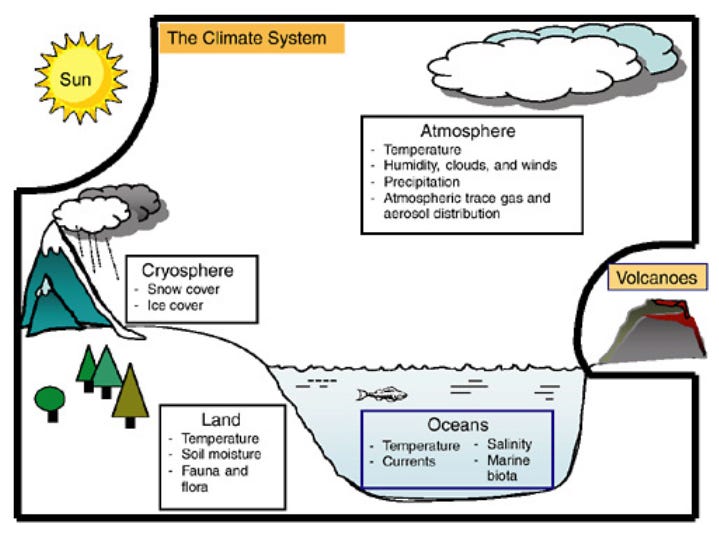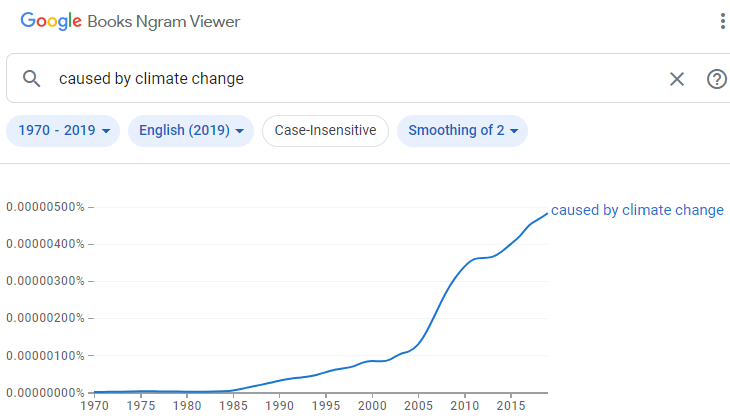It is now a ubiquitous cultural ritual to blame any and every weather event on climate change. Those hot days? Climate change. That hurricane? Climate change. The flood somewhere that I saw on social media? Climate change.
With today’s post, the first in a series, I go beyond the cartoonish media caricatures of climate change, which I expect are here to stay, and explore the actual science of extreme events — how they may or may not be changing, and how we think we know what we know, and what we simply cannot know.
Quite apart from the outsized and oversimplified role of climate-fueled extreme weather in culture and politics, climate is fascinating and important — and worth understanding as more than a meme. This post lays the groundwork for this new THB series, starting with some important definitions and a quantitative thought experiment.
Let’s start with the IPCC (Intergovernmental Panel on Climate Change) definition of climate (bold emphasis added):
In a narrow sense, climate is usually defined as the average weather, or more rigorously as the statistical description in terms of the mean and variability of relevant quantities over a period of time ranging from months to thousands or millions of years. The classical period for averaging these variables is 30 years, as defined by the World Meteorological Organization (WMO). The relevant quantities are most often surface variables such as temperature, precipitation and wind. Climate in a wider sense is the state, including a statistical description, of the climate system.
Climate refers to a “statistical description”1 of the climate system, defined as:
The global system consisting of five major components: the atmosphere, the hydrosphere, the cryosphere, the lithosphere and the biosphere and the interactions between them. The climate system changes in time under the influence of its own internal dynamics and because of external forcings such as volcanic eruptions, solar variations, orbital forcing, and anthropogenic forcings such as the changing composition of the atmosphere and land-use change.

The climate system is complicated, but at a high level, we can get our brain around it (above). There is a deeper discussion to be had about why the climate research community decided that people are not included as part of the “climate system,” but let’s leave that for another day.2
That brings us to climate change:
A change in the state of the climate that can be identified (e.g., by using statistical tests) by changes in the mean and/or the variability of its properties and that persists for an extended period, typically decades or longer. Climate change may be due to natural internal processes or external forcings such as modulations of the solar cycles, volcanic eruptions and persistent anthropogenic changes in the composition of the atmosphere or in land use.3
Let’s correct one pervasive and pathological misunderstanding endemic across the media and in policy, and sometimes spotted seeping into peer-reviewed scientific research:
Neither climate nor climate change cause, fuel, or influence weather.
Yes, you read that right.
Climate change is a change in the statistics of weather — It is an outcome, not a cause.
I often use hitting in baseball as an analogy. A hitter’s batting average does not cause hits. Instead, a batter’s hits result in their overall batting average. Lots of things can change a batter’s hitting performance, but batting average change is not one of them.
As the Google NGrams figure below indicates, the idea that climate change is a causal agent has become increasingly common in recent decades, departing dramatically from its use in the IPCC and much of the scientific community. I am sure you can point to examples that you encounter every day.
Using the IPCC definitions, how would we identify “climate change” in the statistics of weather?
The IPCC explains how we detect climate change:
Detection of change is defined as the process of demonstrating that climate or a system affected by climate has changed in some defined statistical sense, without providing a reason for that change. An identified change is detected in observations if its likelihood of occurrence by chance due to internal variability alone is determined to be small, for example, <10%.
Let’s illustrate through a practical analogy. Hold on to your wallet.
Imagine that you are dealt two cards from a standard combined blackjack deck of 6x52 cards (that is, six combined 52-card decks). From this combined deck, the chances of being dealt at least one ace in a two-card hand is about 14.8%.4
Let’s say that I stack the combined deck by adding 1 additional ace — raising the total from 24 to 25 total aces. Now, what are the chances of getting at least one ace in a two-card hand? The chances have now increased to 15.3%.5
I next add five more aces, for a total of six. Now, in a two-card hand, the chances of receiving at least one ace increases to 18.2%.
We thus have three different decks in our thought experiment:
a standard combined 6x52 deck,
a stacked deck with 1 additional ace — a ~4.1% increase in aces,
a stacked deck with 6 additional aces — a massive 25% increase in aces.
We can next ask, if we did not know that two of the decks were stacked — (2) and (3) — how many hands would we have to play to have a certain degree of confidence that the deck was actually stacked?
To reach a 50% confidence level that the 6x52 card deck was stacked with one additional ace, we would need to play 99 two-card hands. For the stacked deck with 6 additional aces, we’d need just 22 two-card hands.
The table below shows results for different levels of confidence for each of the two stacked decks.
Let’s take the recommended IPCC threshold for detection of change of 90%, and let’s also assume that we play 3 hands per year (comparable to the average number of major hurricanes in the Atlantic every year). In this example to detect a ~4% increase in aces at a 90% level of confidence would require more than 100 years (=329/3).6 Detection of a 25% increase in aces would require almost 25 years (=~73/3).
Note that in this example, the fact and exact magnitude of change (“deck change”) is completely certain. The question is not “Has there been deck change?” (Yes!) but rather, “How quickly does our confidence increase in the existence of that change based on evolving experience?”
The questions become much more complicated if we do not in fact know the magnitude of “deck change” and instead try to use evolving experience to estimate the magnitude of whatever “deck change” may have occurred — for instance, if we are trying to discern whether the change was one or two added aces, or somewhere in between. Complexities multiply further if the number of aces is allowed to change as we are experiencing new hands.
Detection of change is difficult — even in a trivial, stationary statistical process like a very simple card game!
Just imagine if instead we were playing Texas Hold’em or Three Legged Knock7 or some other, much more complicated poker game.
Also, “deck change” cannot be used to attribute the cause of receiving an ace in a single hand. If you know that you have a stacked deck with one additional ace, then you can say with certainty that the odds of receiving at least one ace in your next hand increased from 14.8% to 15.3%.
Did that increase of 0.5% increase cause the ace to appear in your most recent hand?
After 329 hands, you can be 90% confident that the greater number of aces that you received over those hands than you would have expected from an unstacked deck are due to the addition of the extra ace.
A final point for today — The thought experiment described today is a pure statistical example. Dealing two cards from a deck does not remotely describe how weather occurs on planet Earth.
Weather can be characterized statistically, but weather does not occur as a result of simple statistical processes.8 Weather is the the integrated result of at least: dynamical, thermodynamical, chaotic, societal, biospheric, cryospheric, lithospheric, oceanic, vulcanological, solar, and, yes, stochastic processes.
We are underway, much more to come . . .
Comments, questions, discussion, requests — all welcome! THB is reader supported, so please subscribe, share, and participate. All views welcome. Your support makes THB possible, so … Please support!
Statistics: “a mathematical body of science that pertains to the collection, analysis, interpretation or explanation, and presentation of data.”
Remind me down the road — I have an interesting first-hand account of the origins of the so-called “Bretherton Diagram” that shapes climate research and policy to this day.
The IPCC notes that the U.N Framework Convention on Climate Change (UNFCCC) employs a different definition of climate change, a consequential decision that I discussed in Pielke (2005): “Note that the United Nations Framework Convention on Climate Change (UNFCCC), in its Article 1, defines climate change as: ’a change of climate which is attributed directly or indirectly to human activity that alters the composition of the global atmosphere and which is in addition to natural climate variability observed over comparable time periods’. The UNFCCC thus makes a distinction between climate change attributable to human activities altering the atmospheric composition and climate variability attributable to natural causes.”
This raises the issue of statistical significance vs. practical significance — at what level of change can a sophisticated card player exploit the change? I probably could not make money knowing this level of change to the deck.
I’ll refer back to this is a future post.
Trademark, Chip H.
No one is pulling a ball from an urn that says — 11 hurricanes this year!









As a geologist, dealing with long time scales becomes ingrained. I find it fascinating that the IPCC/WMO considers 30 years to be a statistical unit. So I made my own thought experiment, using the past 10K years, which is a period of climate that that likely represents a partial climate cycle and has persisted since the last glacial maximum, thus being a warming period, we would have 333 units of "statistical climate change measurement." But in reality, without using proxy methods of measuring climate that are often only relative measurements, such as tree rings or isotopes, we probably only have 5 units of statistical records (and I am being generous). So really we have seen and attempted to measure (I say attempted because the methods have not been consistent over 150 years), only 1.5% of the climate for the past ten thousand years. And ten thousand years likely represents some sort of partial climate cycle. Yet there are claims that we can see "climate change" in what is essentially a statistically invalid sample for making that conclusion. Considering that the external cycles that affect climate, such as Milankovitch Cycles, with periodicity ranging from 413,000 years to 19,000 years, and Solar Cycles of 8-14 years, which appear to have some larger periodicity outside those limits (e.g. Maunder Minimum). Other internal cycles such as El Nino/La Nina (ENSO) are still poorly understood but proxy methods show these have existed for thousands of years (these are mostly likely controlled by the Wilson Cycle of Plate Tectonics which is in millions of years). I find it hard to believe that a 30 year period of "climate" is meaningful until tens if not hundreds of those units have been observed. And even if for the sake of a thought experiment those units were reduced to single years, we still don't have a meaningful sample size. I don't believe that any of the hyperbolic climate hysteria has any solid basis in fact or statistic, other than being one possible outcome among many more or much less dramatic outcomes, and the opposite conclusion of "global cooling" being almost as likely still. Then I would add to the thought experiment the fact that most of the planet is covered by water, and most of that water-covered area is unmapped and poorly understood, so how do we know the changes taking place at seafloor spreading centers, such as rising mountains (undersea mountain ranges are larger than any above sea level), undersea emissions, and influence on long term deep sea ocean currents? It seems to me we barely have any statistical control over the internal climate factors, much less the external factors. Don't get me started on factors that are generally dismissed or ignored such as metamorphism (which emits CO2) and weathering effects on certain rocks (which absorbs CO2). Then there is the simple fact that 99.99% of all the carbon dioxide on the planet has already been sequestered by marine organisms in the form of carbonate rocks, a process that continues today and has a very apparent directional trend. And I would suggest there too is a cycle in oil and natural gas deposits being returned to the atmosphere from where they originated, since oil and gas is a product of photosynthesis, caused by massive natural oil spills (in the billions of barrels) that can be documented in the rocks many places in the world.
Thanks, Roger for looking into this.. I get lost at the abstraction "extreme events". Can we enumerate those? Extreme heat (how much above what measure?); extreme cold (how much below what measure)? Extreme wind (same); extreme hail (same). These all could have different causes and relation to climate change. Then, if you believed that both extreme cold and heat are related to climate change, then cc is effectively lengthening the tails at both ends of the temperature distribution, which I don't think has ever been (directly) claimed. So I think it might be helpful to dive into the specific extreme events as often abstractions can be used to obfuscate rather than clarify.